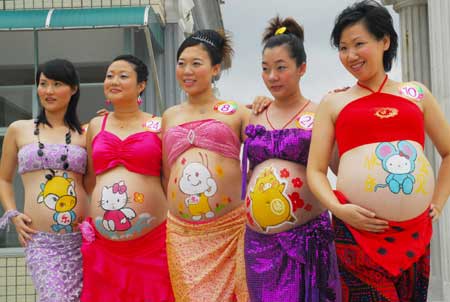| Home > Living in China > Diet |
Drinking Tea in Different Cities
If you want to understand someone, you don't need to know everything about him or her. Sometimes a tiny behavior can betray everything. The same is true with a city - some details hidden in public may be the spirit of the city. Similarly, unique charms and characters of different cities are concentrated, hidden, and permeated in different tea houses.
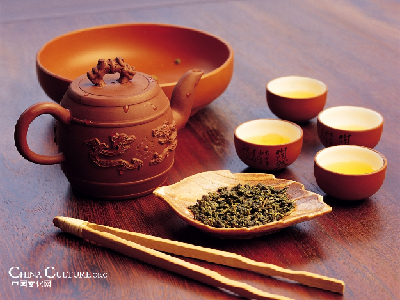
Tea houses have long been seen in China, and are available in the cities along the Yangtze River, Guangdong and Guangxi Provinces as well as Beijing and Tinajin.
Hangzhou and Chengdu are undoubtedly the best in terms of popularity of their tea houses. It is common to see people cluster along the street drinking tea, chatting or playing mah-jongg. Spending a whole day at a tea house is the unique culture of the two cities; low prices make it more feasible there. Certainly, there are some differences between the tea houses of Hangzhou and Chengdu. Hangzhou is famous for its beautiful scenery; drinking tea in the open air is an agreeable enjoyment.
However, most tea houses in Beijing are expensive, and the burgeoning coffee houses and bars are more attractive to young people. Thus, in Beijing, the tea house has become a symbol of luxurious enjoyment and taste.
Unlike Beijing, tea houses of Shanghai and Guangzhou still keep their nostalgic feelings. In Shanghai's tea houses, old items like old-fashioned telephone and kerosene burners will wrap you in an atmosphere of modem blended with the classic. Families get together in noisy tea houses to enjoy tea, and family happiness is distinctive to Guangzhou.
Thanks to the tea house, because its existence make vagrant people have a place to express their emotion and thoughts, inspiring famous works like "Tea House" and "Trilogy of Tea Men" and making acquaint a city no longer a difficult thing.
Beijing, Faded Tea House
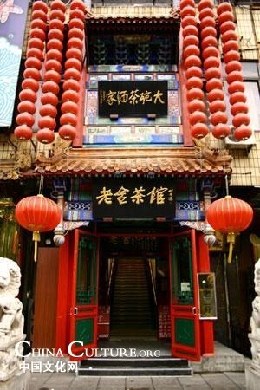 Tea houses used to be places for expressing one's eloquence in old times in Beijing; as for drinking tea itself, is not as important as it in South China. Beijing men drink tea in tea houses just for enjoying traditional opera and chatting with friends.
Tea houses used to be places for expressing one's eloquence in old times in Beijing; as for drinking tea itself, is not as important as it in South China. Beijing men drink tea in tea houses just for enjoying traditional opera and chatting with friends.
Nowadays, many different kinds of tea houses have emerged in Beijing, but, the tea houses with Pekingese characters have become more popular, Many people go to tea houses just because it is a quiet place for chatting or business negotiation, and few people care about the style and culture of tea houses. No wonder most tea houses cluster in shopping centers or neighborhood of office buildings, while they are hardly seen in residential areas.
Indeed, the fast-moving life and expensive price of tea houses in Beijing mean Beijing men can't spend a whole day at a tea house like Chengdu men do.
Guangzhou, Life in Tea house
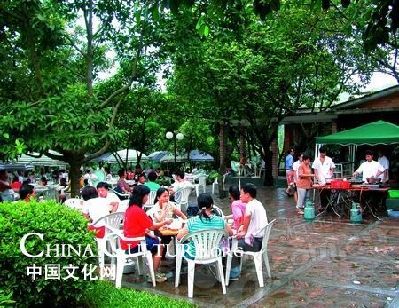 Cantonese are addicted to drinking tea, as keeping with tradition. Drinking tea is not only a habit but also a life style of the Cantonese. Tea house is undoubtedly a brand of Guangzhou.
Cantonese are addicted to drinking tea, as keeping with tradition. Drinking tea is not only a habit but also a life style of the Cantonese. Tea house is undoubtedly a brand of Guangzhou.
Actually, drinking tea in Cantonese tea house not only includes tea but also snacks or dim sum in the local dialect. Dim sum is an important part in tea house, by which its making and variety can fully reveal the quality of the tea house.
Comparing with Beijing and Hangzhou, Cantonese tea house is lucky for its retaining its original flavor. In Beijing, young generation has already forgotten the word "tea house"; while in Hangzhou, stylish tea house has been turning into a place for relaxation just as bar did a few years ago. But, in Cantonese tea house, everything you can hear, see or smell is the original flavor of life.
Viewing from another side, tea house has been a part in native Cantonese spirit; only in here, those people who are always busy for living will stop their step and enjoy happiness of life.
Many native Cantonese can't remember the first time they went to a tea house, probably because tea houses have been a part of their life since childhood. Generally, there are three times for tea (morning tea, afternoon tea and evening tea) at a Cantonese tea house. Usually, the old men will drink morning tea, which is their main relaxation during leisure time. And young people prefer drinking afternoon tea and evening tea.
Snacks of all kinds are provided, showing the art of snack-making at its best. The most popular dim sums are Shrimp dumplings, steamed dumplings with the dough gathered at the top, beef balls, and rice noodle rolls. Only hearing these names you can image how satisfied a family is sitting around eating such delicious dim sums. Some old men can spend half of a day in tea house with just a pot of tea and two pieces oftaro cake or radish cake.
Although Cantonese tea houses are very noisy, nobody plays cards or mah-jongg. Instead, most people are just chatting or reading a newspaper, obviously different from other cities.
Chengdu, Brew with Its Own Flavor
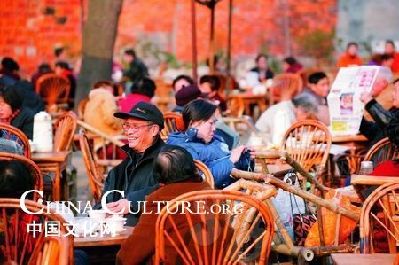 Tea houses to Sichuan people are not only about consumption but also a lifestyle. "Civil" may be the best word to describe Chengdu's tea houses. People usually wear short pants and sandals, and cozily lounge on cane chairs. Tea houses are very common in Chengdu; in famous resorts, busy streets or narrow lanes, you will always find civilian tea houses with abundant local traits.
Tea houses to Sichuan people are not only about consumption but also a lifestyle. "Civil" may be the best word to describe Chengdu's tea houses. People usually wear short pants and sandals, and cozily lounge on cane chairs. Tea houses are very common in Chengdu; in famous resorts, busy streets or narrow lanes, you will always find civilian tea houses with abundant local traits.
Every morning, about 5:00 or 6:00 AM, tea houses open for its customers, and some people even rinse in there and then drink tea and have breakfast - a special scene in Chengdu. Many people pay 10 Yuan and spend a whole day in tea house, enjoying tea, a newspaper, and some birds in cage.
You can enjoy wonderful services such as massages, so you not only relax your body but you’re your mind.
Mah-jongg is an indispensable element. Time weekly once used Leshan Giant Buddha, panda and a man and a woman sitting round playing mah-jongg in Sichuan's regional map as its cover, which reflects Sichuan's character in American's eyes.
Most old men play mah-jongg in tea houses with their peers; middle aged people play mah-jongg with neighbors or family members at home after work or in tea house at weekend; and young people will choose elegant decorated tea houses as their meeting place and play mah-jongg with friends.
Tea houses are a carrier of people's life as well as the best presentation of a lifestyle. If tea can satisfy one's thirst, well then tea house can make Sichuan more charming.
Hangzhou, Tea houses Wonderfully Ornament the West Lake
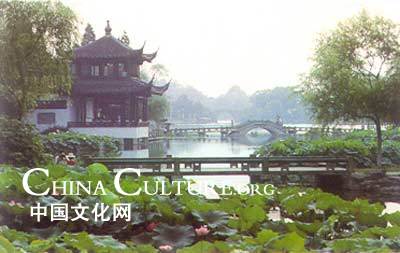 Tea houses in Hangzhou trace back to the Southern Song Dynasty (1127-1279). Then, the Song court was forced to move to Hangzhou as its imperial court because it could not push back the nomadic invaders. Royalty's pursuit for a cozy life triggered the prosperity of tea houses in Hangzhou, where was the place of origin of tea. Even today, tea houses are still the most distinctive landmark in Hangzhou.
Tea houses in Hangzhou trace back to the Southern Song Dynasty (1127-1279). Then, the Song court was forced to move to Hangzhou as its imperial court because it could not push back the nomadic invaders. Royalty's pursuit for a cozy life triggered the prosperity of tea houses in Hangzhou, where was the place of origin of tea. Even today, tea houses are still the most distinctive landmark in Hangzhou.
Hangzhou's climate and water quality are not only good for people but also for tea. Water is the spirit of Hangzhou; only under such excellent natural conditions, can high-quality tea be cultivated.
According to statistics, there are nearly a thousand tea houses in Hangzhou, the top position across the country, reflecting the importance of tea houses to Hangzhou people.
Apart from some tea houses with different styles, tea-stalls with seats in the open air along the West Lake are getting more and more popular. Picking your favorite place, dating some of your best friends in a sunny day or peaceful night, no matter you are chatting or keeping silent, it will be a beautiful scene in your memory.
Hangzhou's tea houses have wonderful tea and water admiring by other cities and cheap prices satisfy the customers. Different kinds of teas can warm your stomach and simultaneously refine your mind. Once you have a taste of Hangzhou's tea you will be addicted to it.
Art
 more
moreClassic Chinese Handicraft:
Porcelain pillows, as classic Chinese handicraft,
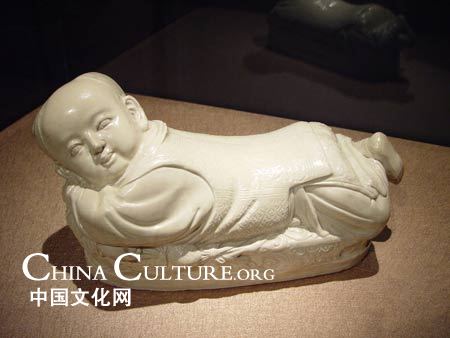
Chinese Treasures Returned from
As witness of Chinese culture and custom, countless treasures
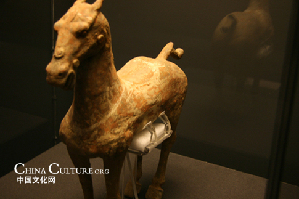
The lost legacy: classical music
Accompany by the long history of China, Chinese classical music
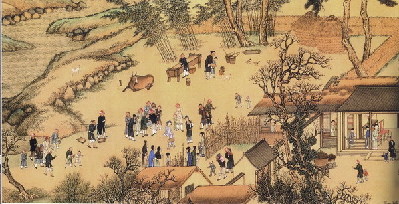
Customs
 more
moreChinese Kungfu
Kungfu Taste: Learn Martial Art in Shaolin Temple
The mention of Shaolin Temple conjures up images of a quiet and
Keet Kune Do will reappears on screen: BRUCE Lee and
The Legend of Bruce Lee is shot by China Central Television
The Road to the Olympic Games for Wushu
Wushu, also called kungfu, martial arts, is attracting more and more




 print
print  email
email  Favorite
Favorite  Transtlate
Transtlate 